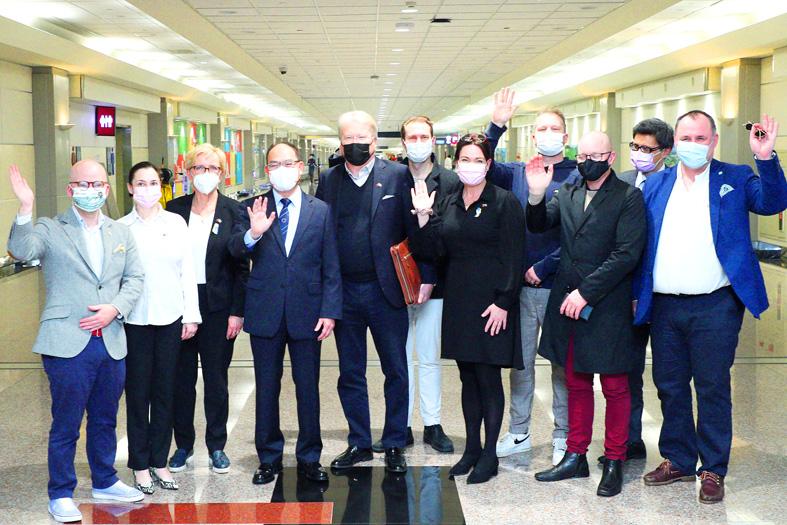Swedish lawmakers have proposed a motion to have a building in Taiwan similar to the House of Sweden in Washington, with the motion expected to be debated and voted on soon, the Ministry of Foreign Affairs said yesterday.
The idea was first mentioned on April 14 during a five-day visit to Taiwan by a Swedish delegation.
The House of Sweden building in Washington is evocative of the climate of Sweden and its political transparency. In addition to being the Swedish embassy, the building also houses the embassies of Iceland and Liechtenstein, as well as Swedish companies.

Photo: EPA-EFE / Ministry of Foreign Affairs
The delegation said it would propose changing the name of Sweden’s representative office in Taipei, the Swedish Trade and Invest Council, to the House of Sweden to symbolize an expanded range of diplomatic work in Taiwan, Department of European Affairs Director Remus Chen (陳立國) said yesterday.
Swedish Parliament Deputy Speaker Kerstin Lundgren on April 14 told reporters in Taipei that she had been one of the lawmakers who initiated the motion, adding that it has received the support of a majority of lawmakers on the Riksdag’s Foreign Affairs Committee.
While the Swedish government has the final say, the Swedish parliament hopes to express its support for Taiwan through this gesture, Lundgren said.
“As a sovereign nation, it is up to Sweden how the ‘one China’ policy is interpreted. From our point of view, the name change does not violate the ‘one China’ policy,” she said.
By changing the name to the House of Sweden, we hope to underscore that Taiwan should be seen as a sovereign nation and not a province of China, Swedish lawmaker Markus Wiechel said at the time.
Meanwhile, the ministry declined to comment on whether Slovenian Prime Minister Janez Jansa’s defeat in elections on Sunday would impact a reported plan to open reciprocal representative offices.
Asked if the ouster of Jansa could jeopardize the reported talks, Chen did not directly answer the question, saying only that Taiwan had congratulated Slovenia on holding a “peaceful election through a democratic process.”
“The government is ready to deepen its cooperation with the new Slovenian government on various fronts and across party lines to pursue mutually beneficial relationships,” he said, without elaborating.
In Sunday’s elections, the ruling Slovenian Democratic Party, led by Jansa, was defeated by Robert Golob and his Freedom Movement party.
Jansa has visited Taiwan on four occasions and he founded the Slovenia-Taiwan Parliamentarian Friendship Association.
During an interview with Indian broadcaster Doordarshan in January, Jansa said that Slovenia and Taiwan were working on exchanging representatives and opening representative offices.

The Central Election Commission has amended election and recall regulations to require elected office candidates to provide proof that they have no Chinese citizenship, a Cabinet report said. The commission on Oct. 29 last year revised the Measures for the Permission of Family-based Residence, Long-term Residence and Settlement of People from the Mainland Area in the Taiwan Area (大陸地區人民在台灣地區依親居留長期居留或定居許可辦法), the Executive Yuan said in a report it submitted to the legislature for review. The revision requires Chinese citizens applying for permanent residency to submit notarial documents showing that they have lost their Chinese household record and have renounced — or have never

A magnitude 5.6 earthquake struck off the coast of Yilan County at 12:37pm today, with clear shaking felt across much of northern Taiwan. There were no immediate reports of damage. The epicenter of the quake was 16.9km east-southeast of Yilan County Hall offshore at a depth of 66.8km, Central Weather Administration (CWA) data showed. The maximum intensity registered at a 4 in Yilan County’s Nanao Township (南澳) on Taiwan’s seven-tier scale. Other parts of Yilan, as well as certain areas of Hualien County, Taipei, New Taipei City, Taoyuan, Hsinchu County, Taichung and Miaoli County, recorded intensities of 3. Residents of Yilan County and Taipei received

Taiwan has secured another breakthrough in fruit exports, with jujubes, dragon fruit and lychees approved for shipment to the EU, the Ministry of Agriculture said yesterday. The Animal and Plant Health Inspection Agency on Thursday received formal notification of the approval from the EU, the ministry said, adding that the decision was expected to expand Taiwanese fruit producers’ access to high-end European markets. Taiwan exported 126 tonnes of lychees last year, valued at US$1.48 million, with Japan accounting for 102 tonnes. Other export destinations included New Zealand, Hong Kong, the US and Australia, ministry data showed. Jujube exports totaled 103 tonnes, valued at

BIG SPENDERS: Foreign investors bought the most Taiwan equities since 2005, signaling confidence that an AI boom would continue to benefit chipmakers Taiwan Semiconductor Manufacturing Co’s (TSMC, 台積電) market capitalization swelled to US$2 trillion for the first time following a 4.25 percent rally in its American depositary receipts (ADR) overnight, putting the world’s biggest contract chipmaker sixth on the list of the world’s biggest companies by market capitalization, just behind Amazon.com Inc. The site CompaniesMarketcap.com ranked TSMC ahead of Saudi Aramco and Meta Platforms Inc. The Taiwanese company’s ADRs on Tuesday surged to US$385.75 on the New York Stock Exchange, as strong demand for artificial intelligence (AI) applications led to chip supply constraints and boost revenue growth to record-breaking levels. Each TSMC ADR represents